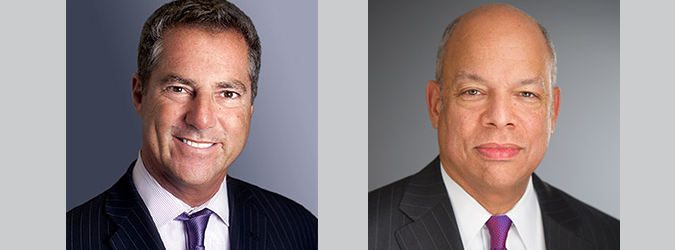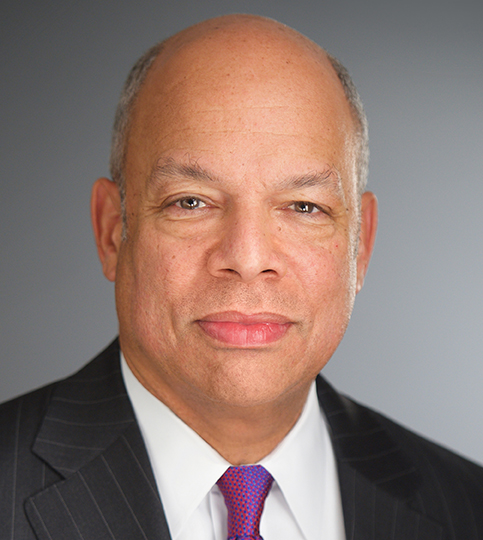Jeh Johnson Expresses Fear for Democracy at Event Sponsored by NY State Bar Association and Foundation
6.4.2021
“I’m very worried about the state of our democracy,” former Secretary of Homeland Security Jeh Johnson told a continuing education program of the New York State Bar Association on June 3.
The event, titled “Advocating for the Rule of Law,” came in response to recent assaults on U.S. democracy, including the “big lie” that President Biden did not legitimately win in 2020; efforts to restrict voting rights around the nation; and the Jan. 6 riots at the U.S. Capitol, an attempt to overturn the presidential election.
“After the first non-peaceful transfer of power in the nation’s history, we’ve begun to see the rule of law as being more fragile than ever before,” said T. Andrew Brown, president of the NYSBA.
Johnson, the keynote speaker, said he’s concerned about the flow of misinformation in the United States, quoting the late Sen. Daniel P. Moynihan’s adage, “You’re entitled to your own opinions, but not your own facts.”
Instead of getting news from a few credible sources, many Americans now rely on Internet sources that only “reaffirm people’s biases,” said Johnson, a partner at Paul, Weiss, Rifkind, Wharton & Garrison in New York City. He pointed to a recent survey showing that 15 percent of Americans believe the Q-Anon delusion that the government is controlled by Satan-worshipping pedophiles, as well as polls finding that a majority of Trump voters believe, against all evidence, that Donald Trump won in 2020.
“That’s a departure from reality, and it’s a scary departure from reality,” Johnson said. “In that kind of environment, our very democracy is threatened. We couldn’t even get Congress to pass a commission to study Jan. 6.”
He pointed out that after last year’s presidential election, Republican efforts to overturn the results in the courts were turned back by judges appointed by both Democrats and Republicans.
“In the aftermath of the 2020 election, our courts really did shine through and stood up for the rule of law,” he said.
At the same time, the fight for fair elections is far from over, according to voting rights attorneys who also spoke at the program.
“We’re seeing a struggle for the heart and soul of our democracy, and the right of African American and Latinx people to participate,” said Ted Shaw, a distinguished professor of law and director of the Center for Civil Rights at the University of North Carolina and former president of the NAACP Legal Defense Fund.
In a number of states around the country, Republican-led legislatures are seeking to make it harder to vote, often citing baseless claims of voter fraud in 2020. Among other tactics, they’re trying to limit early or mail-in voting and making identification requirements stricter. The Supreme Court opened the door to these actions in 2013 by weakening the Voting Rights Act, first passed in 1965.
Dale Ho, director of the American Civil Liberties Union’s Voting Rights Project, pointed out that after the Voting Rights Act was passed, there was a longstanding bipartisan consensus that voting should be non-discriminatory. But, he said, that consensus broke down and voter suppression efforts ramped up after 2008, when turnout soared among African-American, Latinx and Asian voters.
Myrna Perez, director of voting rights and elections at the Brennan Center for Justice, said it’s not enough to fight for voting rights in the courts; advocates must also convince the American people that democracy works best when everyone is included.
“We need to be making the case every day for democracy,” she said.
Voting rights advocates must be on the alert not only for legislation to suppress voting, but also efforts to subvert a fair election after the fact, Ho said.
“I’m shocked that I’m mentioning these possibilities,” he said.
While all the voting rights advocates said there’s reason for deep concern, Perez hopes that politicians will realize it’s not “politically viable” to put up obstacles to voting. “Voters care about voting,” she said. “They showed up to vote in record numbers last November, when we were in a once-in-a-century pandemic.”
The Advocating for the Rule of Law event also included a panel on the need for civics education to make sure that students understand the importance of the rule of law. Panelists focused on a range of initiatives, including training for teachers, mock trial competitions, and mentorships by law firms.
Another panel discussed countering the spread of misinformation on the Internet.
In the face of alarming trends like voter suppression, Johnson was asked if there’s room for any optimism about preserving the rule of law. He quoted his grandfather, Charles Johnson, a sociologist and university president who lived his entire life in the South before any civil rights legislation was passed. Charles Johnson once wrote: “Faith in the ultimate strength of the democratic philosophy and code of the nation as a whole has always been stronger than the impulse to despair.”






